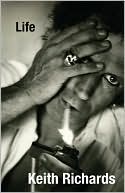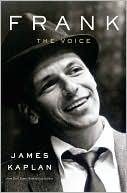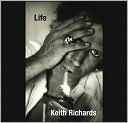Keith Richards: Satisfaction
When he first came before a judge in the 1960s, Keith Richards heard himself described as "a moron" and read newspaper headlines announcing UGLY LOOKS! UGLY SPEECH! UGLY MANNERS! Yet Richards's strangely flamboyant personality, filled with eccentricities and contradictions, suggested a more complex character than the "elegantly wasted" junkie who wrote and played the Rolling Stones' best-known songs. In an industry notorious for its high burnout rate, Keith Richards remains a legendary...
Search in google:
When he first came before a judge in the 1960s, Keith Richards heard himself described as "a moron" and read newspaper headlines announcing UGLY LOOKS! UGLY SPEECH! UGLY MANNERS! Yet Richards's strangely flamboyant personality, filled with eccentricities and contradictions, suggested a more complex character than the "elegantly wasted" junkie who wrote and played the Rolling Stones' best-known songs. In an industry notorious for its high burnout rate, Keith Richards remains a legendary survivor. This candid look at the Rolling Stones legend is being published in conjunction with Richard's sixtieth birthday celebration. Keith Richards: Satisfaction looks at the career of a man who was as admired as he was feared. In this behind-the-scenes story, employing dozens of new sources, the author charts the life and music of the shy, half-educated boy from Dartford, the writer of pop classics like "(I Can't Get No) Satisfaction," "Ruby Tuesday," and "Brown Sugar"; the kohl-eyed drug addict slumped on his mattress throne at the Ritz Hotel, and the more recently contented family man who nonetheless continues to be rock's most indomitable living practitioner. It's a hard, fast, sometimes shocking saga of a flawed but wildly creative life. Publishers Weekly Having written books on Kurt Cobain, Bruce Springsteen, Mick Jagger, Eric Clapton and Sting, among others, Sandford is no stranger to the rock bio and attacks his newest venture with skill and style. Despite limited access to "the Human Riff," Sandford taps into scores of sources to construct Richards's story. While his prose might be a little too English for some stateside readers ("Keith's hair was teased high as a guardsman's busby" might not resonate with everyone), Sandford does an expert job of capturing a complicated subject. Stones fans will cherish stories of the band coming together-such as when Richards met a bright young London School of Economics student named Mike Jagger-the genesis of their hits, bandmate Brian Jones's staggering self-destruction and their fateful Altamont performance. There's enough drugs, booze and sex to satisfy even the most lusty soul, with entertaining cameos from the likes of Clapton, the Beatles and Marianne Faithfull, the latter immersed in a tempestuous love triangle with the so-called Glimmer Twins. "Faithfull fell in love with Keith as she rejected Jagger's blundering sexual advances. Which he repeated with astonishing resilience," Sandford writes. "Only a day or two later Keith unselfishly confirmed what Marianne already knew. `Mick's really stuck on you. Go on, luv, give him a bell. He's not so bad.' " While it's frequently difficult to tell who the author is quoting, his easy storytelling style and expert musical knowledge make for a satisfying read. (Apr.) Copyright 2004 Reed Business Information.
Author's NoteixAcknowledgementsxi1Connection12Mannish Boy143'So Ugly, They're Attractive'554An Inspector Calls1015Tropical Disease1586'We Want to Play. You Want to Play. Where Are You?'1997Soul Survivor2438One Hit (To The Body)2729'String Us Up and We Still Won't Die'30010Performance323Bibliography349Sources and Chapter Notes351Index359
\ Publishers WeeklyHaving written books on Kurt Cobain, Bruce Springsteen, Mick Jagger, Eric Clapton and Sting, among others, Sandford is no stranger to the rock bio and attacks his newest venture with skill and style. Despite limited access to "the Human Riff," Sandford taps into scores of sources to construct Richards's story. While his prose might be a little too English for some stateside readers ("Keith's hair was teased high as a guardsman's busby" might not resonate with everyone), Sandford does an expert job of capturing a complicated subject. Stones fans will cherish stories of the band coming together-such as when Richards met a bright young London School of Economics student named Mike Jagger-the genesis of their hits, bandmate Brian Jones's staggering self-destruction and their fateful Altamont performance. There's enough drugs, booze and sex to satisfy even the most lusty soul, with entertaining cameos from the likes of Clapton, the Beatles and Marianne Faithfull, the latter immersed in a tempestuous love triangle with the so-called Glimmer Twins. "Faithfull fell in love with Keith as she rejected Jagger's blundering sexual advances. Which he repeated with astonishing resilience," Sandford writes. "Only a day or two later Keith unselfishly confirmed what Marianne already knew. `Mick's really stuck on you. Go on, luv, give him a bell. He's not so bad.' " While it's frequently difficult to tell who the author is quoting, his easy storytelling style and expert musical knowledge make for a satisfying read. (Apr.) Copyright 2004 Reed Business Information.\ \ \ \ \ Library JournalSome of Keith Richards's friends refused to talk to rock writer Sandford for fear of angering the iconic Rolling Stones guitarist, but they needn't have worried. In the author's eyes, "Keef" can do no wrong; he is "a prince of darkness, but a prince nonetheless." Sandford acknowledges that the book "was written by someone sympathetic, or much more, to its subject," yet that sympathy rarely extends to the rest of the band. Sandford endows his subject with the nearly superhuman powers of almost single-handedly crafting the Stones's most enduring music, even while in the deep clutches of (insert drug of choice here) addiction. To make his achievements seem even more impressive, Richards is portrayed as getting little help from band mates, who are either faceless sidemen or, in the case of Mick Jagger and Brian Jones, pretentious buffoons. Sordid tales of Richards's drug-induced excesses are all forgiven because close to the surface of his elegantly wasted persona is a down-to-earth bloke who dotes on his kids and loves his mum. Fans will eat it up, though some Yanks may be perplexed by Sandford's regular use of British colloquialisms. Entertaining though hardly definitive, this has a place in large music collections that already own more balanced histories of the Stones as a group (e.g., Stephen Davis's Old Gods Almost Dead).-Lloyd Jansen, Stockton-San Joaquin Cty. P.L., CA Copyright 2004 Reed Business Information.\ \ \ Kirkus ReviewsHollow if high-revved portrait of the Rolling Stones guitarist and songwriter from rock-music biographer Sandford (Mick Jagger, 1994, etc.). The only thing missing, tellingly, is his subject's voice. The Stones may now be "the officially tolerated moral slobs of the middle class," as Sandford writes, but it wasn't always so; their early dazzle was a scandalous counterpoint to Britain's dismal Edward Heath years, and Richards in particular has been arrested and harassed for his drug use from Japan to California. Since the author did not have immediate access to the musician or his friends for this unauthorized biography, the material comes from published work, remote interviews, fanzines, and Sandford's relatively brief entree with the group as a reporter. While he tells much about Richards as a virtuoso and economical guitarist, a rhythmical innovator, a musician of sentimentality, emotion, and passion, and a man versed in his traditions, all this might be surmised by acute listeners from exposure to an album or a concert. And any reader of the rock-'n'-roll music press will be familiar with his influences in the world of music, with such delicious moments as Chuck Berry telling him to "fuck off" when Richards went to meet him backstage, with his many tiffs with fellow band members, especially Brian Jones, and with the women in his life, including the mother of his children, with whom he didn't mind exchanging fisticuffs. This all renders dubious Sandford's claim that Richards has a "deep need for roots and domesticity," not to mention the author's timeworn rationale for the guitarist's abundant drinking and drug use ("not so much vices as the working out of a complementary dark sidewithout which the juices couldn't flow"). Ultimately, the author fails to convey any deep sense of what inspired either Richards's self-destructive behavior or the songwriting and guitar work that got him dubbed the "Human Riff." Less than a glance at what drove "the man death forgot."\ \








